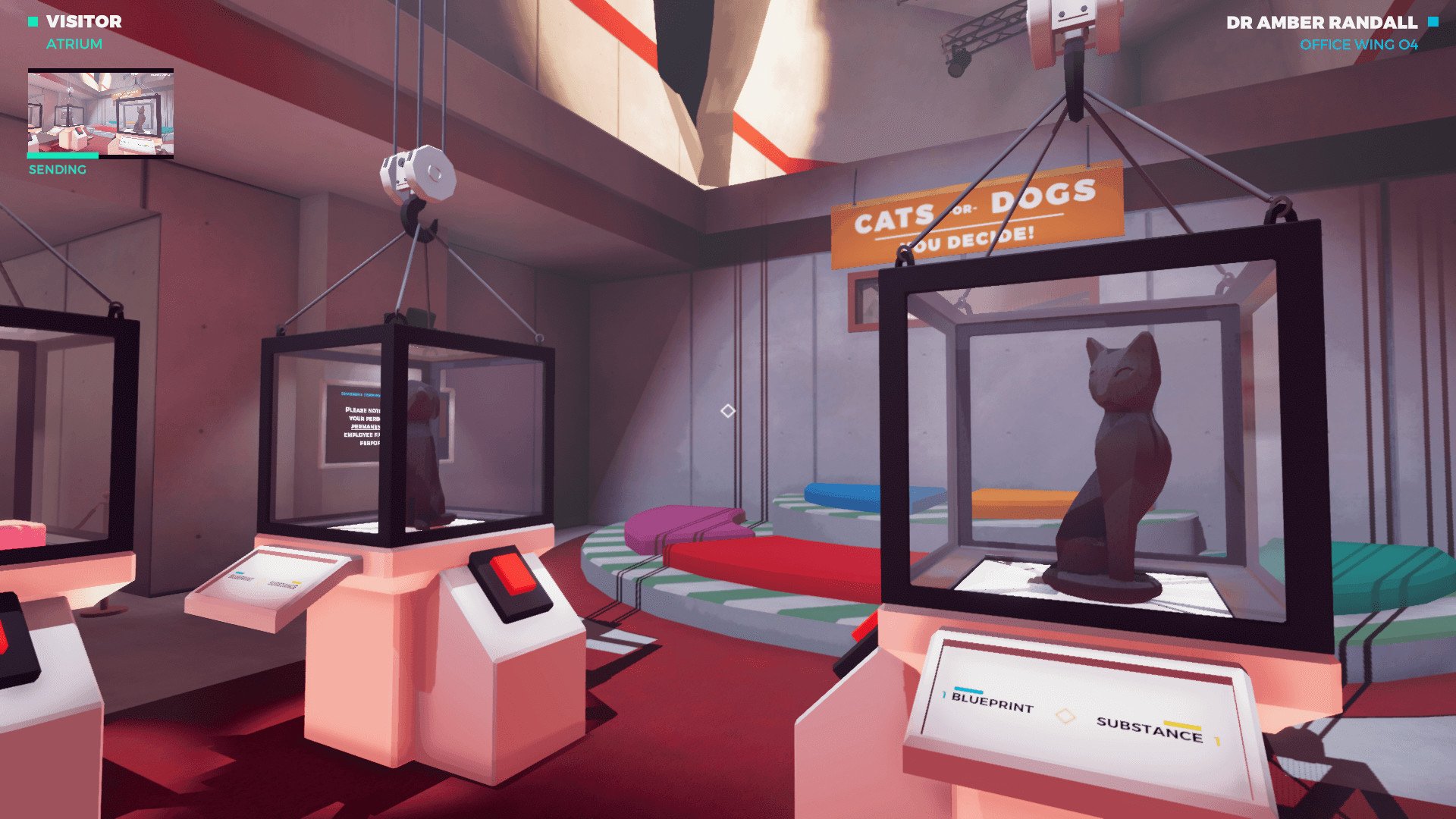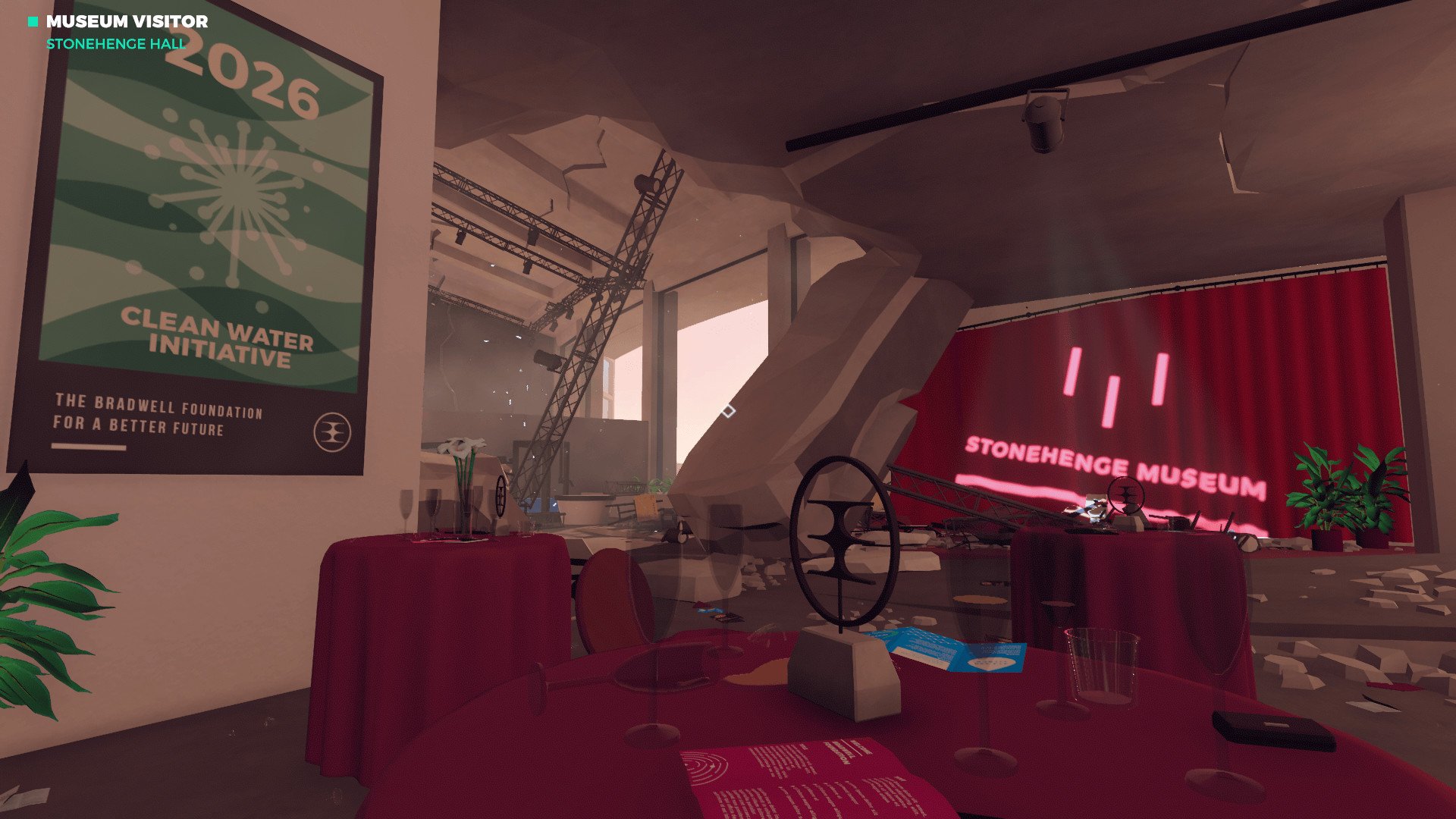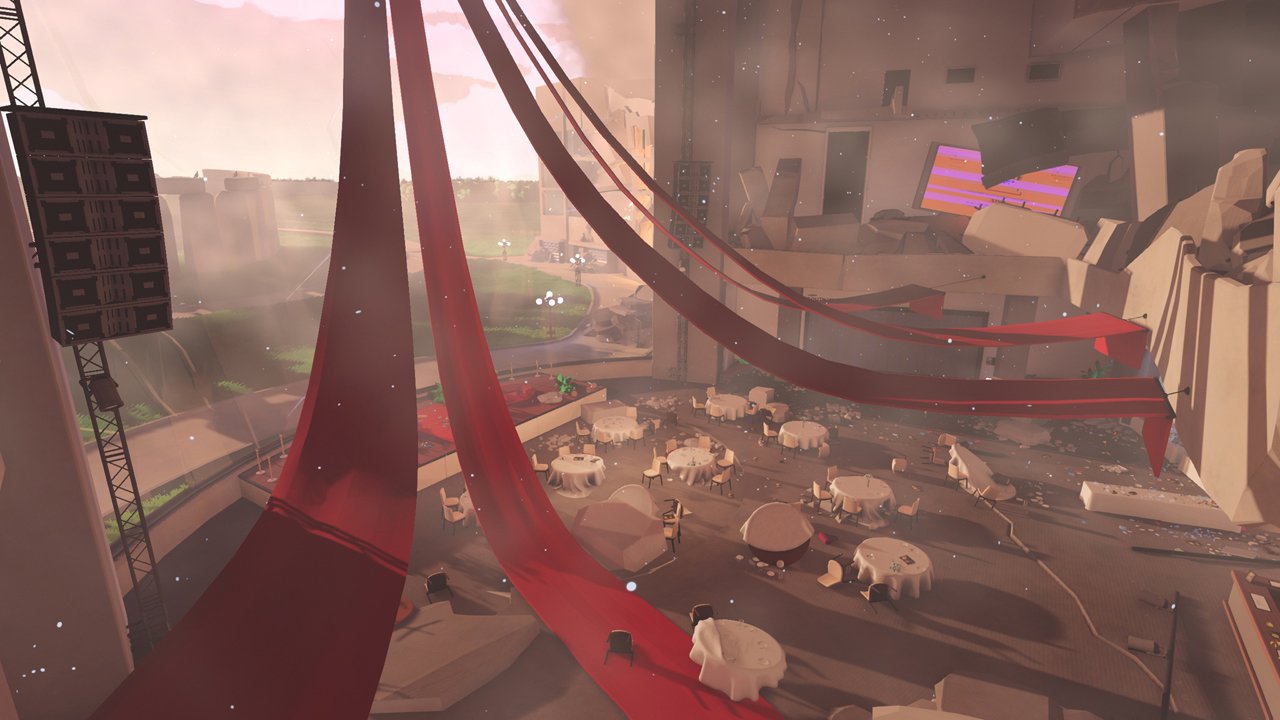Up until this point, Bossa Studios has been known for one-note but delightfully absurd games that mask huge challenges behind cheery exteriors. "Surgeon Simulator" and "I am Bread" are two of the hardest games I've ever played, but have simple foundations. Perform surgery? Easy enough in a game. What about making a piece of bread move across a kitchen? A little less obvious, but manageable.
However, the developers love playing around with control schemes, which is where the true difficulty comes into play. In Surgeon Simulator, for example, you control every single finger, which makes surgery even more challenging.
That's why I was surprised to pick up The Bradwell Conspiracy, a game that Bossa Studios helped publish, which takes the puzzle-solving the brand is known for and combines it with a single-player, linear narrative. You're a mute protagonist that wakes up after an explosion at a museum and has to find their way out while uncovering the mysteries of the Bradwell family and its corporation. You're equipped with a pair of AR glasses and an SMP, a device that's essentially a portable 3D printer, and you need to use it all to solve puzzles, open new areas, and hopefully get out before the whole place crashes in on itself.
Despite being developed by A Brave Plan (an indie debut), The Bradwell Conspiracy manages not to stray too far from Bossa's brand. It's still a challenging puzzle game with finicky and tough controls. However, I don't think developers were able to succeed in combining the puzzles and the narrative. It creates a game that has a lot of potential and has some standout moments but is ultimately frustrating for no reason and, most unfortunately, arbitrary.

Bottom line: The Bradwell Conspiracy is a game that gets in its own way when it comes to its most important element: puzzles.
Pros
- Great writing
- Colorful art design
- Intriguing yet predictable mystery
Cons
- Puzzles are arbitrary
- Controls too finicky
- Game is short
- A lot of issues to fix in Day One patch
Bradwell Conspiracy: What I liked
Despite being a puzzle game, The Bradwell Conspiracy's biggest strength is in its writing. The game creates a legitimately intriguing mystery to solve at the Bradwell Foundation, which is built right near Stonehenge and is itself one of our world's biggest mysteries. Dropping in bits about the landmark and how the company has been using it to their advantage does keep you guessing, even if it's easy to understand that it's clearly being used for monetary gain. The villains are given enough depth that even the most nefarious of plans are rooted in sympathy, which makes the reveal at the end more sad than threatening.
The Bradwell Conspiracy's biggest strength is in its writing with three-dimensional villains and great dialogue.
Adding to the writing is some great dialogue, which can be attributed in part to Jane Espenson, who I was surprised to find was brought on as a dialogue consultant. You might not know the name, but you'll know her filmography. She's been all over Hollywood but is probably best known as one of the creative minds behind the witty, snappy dialogue in Buffy the Vampire Slayer.
This is apparent here, specifically with Amber, a character who shows up as a face towards the end of the game but is mostly a disembodied voice that helps you along. She's your key point of contact for most of the game, so her dialogue needed to be memorable and convey nuances about her character, and luckily for us, it does. It's sarcastic and funny when it needs to be, but the writers toned it down and grounded it when she needed to be serious. When she interacts with The Guide, AR glasses that your character wears and can be found around the facility, it's not overbearing, but amusingly annoyed. The Guide's narrator has personality as well, which adds humor when he says the equivalent of "does not compute."
All the latest news, reviews, and guides for Windows and Xbox diehards.
The wit also appears in the smallest of places. You have the option to read the emails of certain employees, and while most of them are either dry and straightforward or full of exposition, you can catch glimpses of humor and personality. It's not overwhelming or distracting but adds flavor to the Bradwell Foundation that makes the place seem more alive.
Despite issues I had with the puzzles (more on this later), there are a few in here that feel great to solve. Since these puzzles are large, finding the one thing that can help you cross a point is an accomplishment. Even some of the more frustrating puzzles feel good to complete, especially when the thing at the end is movement in the plot.
Bradwell Conspiracy: What I didn't like

Creating a puzzle game is a tough endeavor. You have to create complex and challenging riddles for the player to solve, but they also need to make sense in context. If there's a narrative, the world where the game takes place has to be understandable even with the addition of sometimes long-winded problem-solving.
The problem with the puzzles isn't just that they're difficult, but that they're arbitary.
The problem with the puzzles in The Bradwell Conspiracy isn't just that they're difficult — what kind of puzzle game would this be if the key component didn't present some sort of challenge? The problem is that they're arbitrary. The puzzles only exist because certain elements of logic were thrown out for the sake of creating said puzzles. For example, you have to create a platform to get to a raft in waist-deep shallow water, even though your character should be able to get into it themselves. The only reason you can't is that there's no "jump" button.
It's even tough to place the objects you create correctly, attempting to place them a centimeter to the right will cause it not to work. This might work better on mobile (the game was released this weekend on Apple Arcade and is also hitting the Nintendo Switch later this week), where the playing field is a lot smaller, but on Xbox, it creates unnecessary frustration. Key bindings weren't optimized for the Xbox, with the X button pulling double duty in some places, which isn't a hinderance but is annoying.
A key aspect of your character is that they can't talk. After the explosion at the start of the game, your Guide tells you that your larynx has been damaged due to smoke inhalation. In order to communicate with Amber, which is mostly done over a comm in your glasses, you have to send her pictures. This narrative element becomes important when you need her to control something remotely. Unlike other puzzle games with a mute protagonist, this comes off less like a story choice and more like an excuse, another logic break that only creates another obstacle for the player.

Let's take a look at other Bossa games to get an idea of how this should be done. The whole idea of Surgeon Simulator is that the controls are nearly impossible to use. The challenge therein is not just about trying to get through a level, but also in learning how to navigate each finger to perform a complex task. I am Bread is similar, but with even more irreverence to counteract the difficulty of the game. What separates these two games from The Bradwell Conspiracy though, is that they're one-note. You, as the player, can excuse the straying from logic because the ideas are absurd, and the art is heavily stylized in its presentation. It feels like you're playing around in a cartoon, where the basis doesn't matter so much as the punchline. When there's little narrative to complete or character development to get through, it's forgivable to spend hours on surgery.
The Bradwell Conspiracy, on the other hand, seemingly takes place in a version of the real world. The tutorial level teaches you how to walk, crawl, and how to use your Guide interface, and the absence of things like jumping or talking is telling since there's no reason why the shouldn't have been omitted. Unless, of course, you're just making things tougher for the player.
There is a Day One patch

A lot of other issues I had will hopefully be fixed in the Day One patch. However, I'm going to list some of my concerns here for disclosure's sake. I had to restart the game multiple times because an element would break, or I'd get stuck in a section that was impossible to get out of without glitching the area. I also had performance issues on my Xbox One with frame rate drops at important moments or outright freezes that made me think the game was going to crash.
Luckily there are only a couple of timed puzzles, so a frame rate drop isn't going to impact gameplay greatly. More troublesome was how the picture-sending mechanic, which is mandatory to complete certain puzzles, would stop working. Restarting the game solved the issue, and the game saves often enough that you don't have to backtrack too much. However, having to complete some complicated puzzles again was agonizing, especially when some of the issues listed above came back into play.
I'll have to go back into the game and check to see what's been updated with the Day One patch, but for now, we can only speculate and hope that some of these issues were addressed.
Final thoughts
The Bradwell Conspiracy is the kind of puzzle game that fans of the genre will probably enjoy regardless of how much the puzzles don't actually fit into the established logic of the world. The solutions are picky, and some choices don't make any sense. However, if you like puzzles and want more of them, then The Bradwell Conspiracy will probably scratch that itch.
It's when you look closer that you realize the game is creating obstacles for the sake of the challenge rather than letting them mesh naturally. It's frustrating as a player to not be able to do basic tasks because the developers wanted to make a game tougher, but it makes the choice more glaring. It's distracting from what is some decent writing and a mystery that, while predictable, still manages to hit some emotional notes.
Bossa spent years making games where the challenges were at the forefront, and now that there needs to be a balance, it struggled.
The Bradwell Conspiracy releases Oct. 8, 2019, on PlayStation 4 and PC, Oct. 10 on the Nintendo Switch, and Oct. 11 on Xbox One. The game is already out on Apple Arcade.
Xbox
Main
- What is Xbox Game Pass?
- Best 4K TVs for Xbox Series X and S
- Must-buy Xbox One Headsets
- Our Favorite Xbox One Wireless Headsets
- Best Upcoming Xbox Games for 2021
- Xbox One X vs. Xbox Series S
The game was reviewed on an Xbox One with copies provided by the publisher.
Update: Clarified that Bossa Studios was the publisher, not the developer of the game.

Carli is the Former Gaming Editor and Copy Chief across Windows Central, Android Central, and iMore. Her last name also will remind you of a dinosaur. Follow her on Twitter or email her at carli.velocci@futurenet.com.


